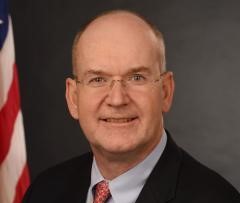Implementing 21st Century Cures Act Preoccupies ONC’s Work
The work of ONC is dominated by implementing the 21st Century Cures Act, particularly in the areas of reducing provider burden and promoting health IT interoperability, says the ONC chief.

Source: Thinkstock
- The work of the Office of the National Coordinator for Health Information Technology (ONC) is dominated by implementing the 21st Century Cures Act, particularly in the areas of reducing provider burden and promoting health IT interoperability, said National Coordinator for Health IT Donald Rucker in his Friday’s keynote address at the ONC 2018 annual meeting being held in Washington, DC.
In the area of reducing provider burden, Rucker cited the release this week of a draft of its Strategy on Reducing Burden Relating to the Use of Health IT and EHRs as an example of his office’s work and encouraged the audience to comment on it.
“If you identify burdens, I’d like you to take the time to comment on that,” Rucker said.
ONC has also done work on rethinking medical evaluation and management codes. “If you look at modern medical records, much of the text is boilerplate that has nothing specific to do with the patient … As a clinician, it is a treasure hunt to find actual patient facts in the records,” he said.
Some of ONC’s work on coding was incorporated into the recently revised Centers for Medicare and Medicaid Services’ physician fee schedule.

Donald Rucker
Source: ONCIn the area of interoperability, Rucker stressed that “interoperability is at the center of value, the center of efficiency, and the center of effectiveness in the healthcare system. The vision of interoperability is something much broader than just moving medical records from one provider to another. We have to look at interoperability in the context of empowering patients.”
“Clearly, interoperability is a work in progress, but I think we have already made significant progress,” he said.
Rucker cited the example of a Memphis-based group of optometrists and ophthalmologists, who are using direct messages to manage their referral process. The message allows the referral and demographics to automatically populate into a chart. “This is an example of the vision of connected care that we have all been talking about,” he said.
ONC is focused on implementing three major provisions of the 21st Century Cures Act: information blocking, open application programming interfaces (APIs), and Trusted Exchange Framework and Common Agreement.
“We have already seen behavioral change regarding information blocking since the Cures Act was passed in December of 2016,” he said. ONC is tasked with defining the exemptions to the information blocking prohibition.
In terms of open APIs, ONC is including a high level of security in the open API rules it is developing. “The open API part of Cures is extraordinarily exciting … APIs are transformative in so many parts of our economy,” he said.
Rucker said that healthcare has been fortunate to have the Fast Health Interoperability Resources (FHIR) standards, which is the standard for exchange of healthcare information that was developed by Health Level Seven International (HL7).
“There are a number of vendors who are out there connecting medical records. Apple has been quite active in this area. Apple uses the ONC-derived stack to do this. So, we have seen some of the work already happening,” he said.
To gather and analyze population-level data using APIs, ONC is working with health payers and other interested parties through the DaVinci Project and the P2 FHIR Task Force under the leadership of Charles Jaffe at HL7 to look at population-level data. “This is what fuels knowledge, science, economic accountability, public health, and research … We need APIs to get at big data in healthcare,” Rucker said.
The Trusted Exchange Framework and Common Agreement is the third provision in the Cures Act that ONC is implementing. The aim of this provision is to address the fragmentation of health networks by enabling them to talk to each other.
ONC is work on the specific terms and conditions to be incorporated into the single Common Agreement by a Recognized Coordinating Entity, as well as the general principles that Qualified Health Information Networks should follow. Rucker said that ONC would have that work out for further comment soon.
“These are amazing times for information technology. We are a seeing a rapid set of advances. The way we deliver care is changing fantastically. We have a great opportunity to reset the stage for the American public,” he concluded.
